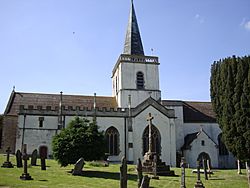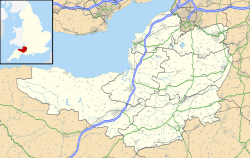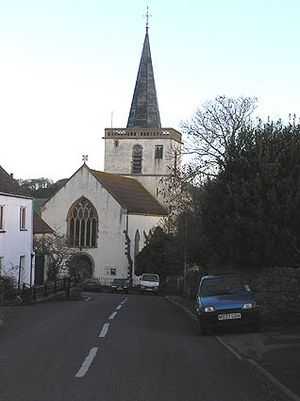Priory of St. Andrews of the Ards facts for kids
 |
|
| Monastery information | |
|---|---|
| Order | Benedictine |
| Established | c. 1100 |
| Disestablished | c. 1440 |
| People | |
| Founder(s) | William de Falaise |
| Site | |
| Location | Stogursey, Somerset, England |
| Coordinates | 51°10′50″N 3°08′30″W / 51.18065°N 3.14162°W |
| Visible remains | Church and dovecote |
The Priory of St. Andrews was an old Benedictine monastery located in Stogursey, Somerset, England. It was also known as Blackabbey. Monasteries are places where monks or nuns live and dedicate their lives to religious practices.
Contents
History of the Priory
How the Priory Started
The area where the priory was built was first known as Stoke. After the Norman Conquest in 1066, a man named William de Falaise owned the land. He married Geva, and their daughter, Emma, later married William de Courcy.
When Emma and William de Courcy got married, they received the land as a gift. The village was then renamed Stoke Courcy, which is now known as Stogursey.
To keep a connection with their family's roots in Normandy, William de Falaise gave the priory to the Benedictine Abbey of St Mary at Lonlay. A "cell" means it was a smaller religious house that depended on a larger monastery. Around 1100–1107, a group of monks came to Stogursey and built their own priory. It was called "The Priory of St. Andrews in Stogursey."
The De Courcy Family Connection
The children of Emma and William de Courcy took their name from the village, becoming known as de Gursey, de Curci, or de Courcy. One famous member of this family was John de Courcy. He became very powerful in Ulster (part of Ireland) after conquering it in 1177. He took control of Antrim and Down.
Around 1183–84, John de Courcy gave land to the Priory of St. Andrews in Stogursey. This land was in a place called Lart or The Ardes in Ireland.
Becoming "Blackabbey"
In 1204, the Benedictine priory was officially built and named "The Priory of St. Andrews of the Ards." Over time, this priory became more commonly known as Blackabbey. This was because of the dark-colored clothes the monks wore.
The Priory's End
As years passed, the priory became less important. It was often taken over by the king. At one point, it was even rented out to a local official, Johannes Bakeler, who was the town's MP.
Around 1440, the priory was officially taken over by the crown. King Henry VI then gave the priory's wealth and lands to Eton College. This famous school, located near Windsor, had been founded by King Henry VI a few years earlier.
What Remains Today
Today, almost nothing is left of the original priory building. However, the Church of St Andrew still stands. This church also served the local village. It is a very important historical building, recognized as a grade I listed building by English Heritage.
The church might have been built on top of an even older Saxon site. It is one of the largest historical sites in West Somerset. The church still has parts of its original Norman design, especially its tower and transepts (the parts that stick out on the sides). It also has the original rounded ends (apsidal) of the transepts and chancels (the area around the altar).
There is also a circular, thatched medieval dovecote (a building for pigeons). It was rebuilt in 1925, but its steps are original.
 | Selma Burke |
 | Pauline Powell Burns |
 | Frederick J. Brown |
 | Robert Blackburn |



